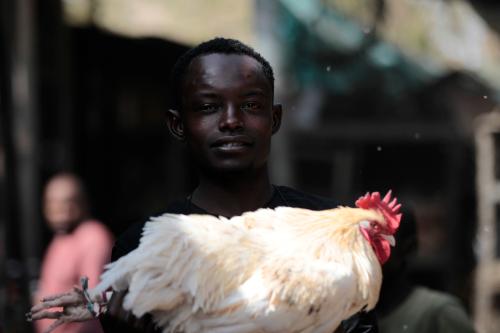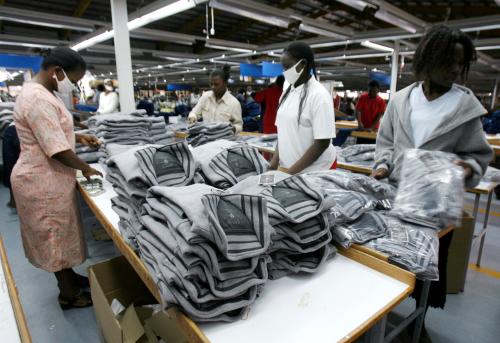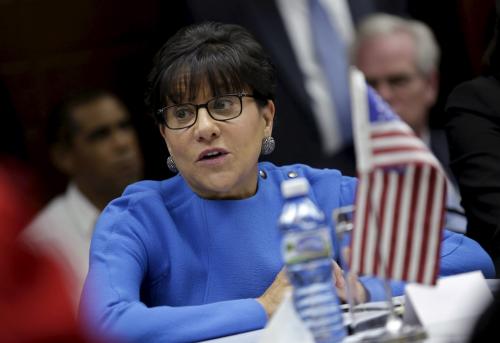President Obama, on January 11, suspended the application of duty-free treatment to South Africa’s agricultural exports that come into the U.S under the African Growth and Opportunity Act (AGOA). The suspension will take effect on March 15 if South Africa does not lower tariffs on American poultry products before then.
The development represents another twist in a saga that gained momentum nearly two years ago when U.S. poultry and meat producers called on Congress to not renew AGOA as long as South Africa continued to keep their products out of its market by imposing maximum import duties of 82 percent.
In fact, in the 24 months leading up to AGOA’s renewal for 10 years last June, South Africa was concerned that it might be “graduated” from AGOA altogether. There were some in Congress who argued that, given the advanced nature of South Africa’s economy and the fact that it is the largest AGOA beneficiary due largely to the volume of automobiles exported to the U.S., South Africa did not need the program. This situation led to a sustained, and ultimately successful, effort by South Africa’s Minister of Trade and Industry Rob Davies to persuade the Obama administration and members of Congress that denying benefits to South Africa would be to the detriment of the Southern Africa region and not just South Africa itself.
Throughout the AGOA renewal process, two of the most outspoken advocates for strong commercial ties between the U.S. and Africa, Senators Chris Coons (D-DE) and Johnny Isaackson (R-GA), were also adamant that U.S. poultry producers be given fair access to the South African market.
Earlier this month, on January 7, Minister Davies announced that the issue had been resolved. South Africa would open its market immediately to 65,000 tons of U.S. poultry imports and U.S. exporters would receive a rebate on any anti-dumping duties. U.S. Trade Representative Michael Froman, however, responded that obstacles remained and that the “final benchmark” would be the ability of South African consumers to buy the American products in local stores.
President Obama’s action four days later drove the message home: The U.S. would not tolerate the unfair treatment any longer.
In a comment to South African media last week, Mike Brown, the president of the U.S. National Chicken Council, said that the last hurdle was for the South African government to issue import certificates and for U.S. food and safety inspectors to approve the exports. Brown estimates that U.S. product could be in South African stores within 30 days, prior to the March 15 deadline.
In fact, a deal to end anti-dumping and food safety and health trade barriers on U.S. poultry was reached last June in Paris between South African and U.S. negotiators. Final removal of these barriers, however, has been exceedingly slow, leading to the Obama threat to suspend South African agricultural products.
If the suspension goes into effect, the impact would be significant, especially as it concerns the wine and citrus industries in the Western Cape. Last year, South Africa exported $176 million worth of agricultural products to the U.S. under AGOA, and the wine industry alone employs nearly 170,000 workers.
There is optimism that this trade dispute can be resolved. In a statement issued in early January, Senator Coons and Isaakson said that South Africa’s decision to fulfill the obligations of the Paris agreement would mean that “after more than 15 years of illegal anti-dumping duties and unfair trade policies, American poultry will finally be able to enter the South African market.”
In contrast to the negotiations a decade ago to create a free trade agreement between the U.S. and the Southern African Customs Union, which ended in failure, both U.S. and South African negotiators have remained focused on achieving a successful outcome to the poultry dispute.
A positive outcome to this trade dispute would create welcome momentum in U.S.-South African trade relations. As South Africa assesses its relationship with China and the other BRICS (Brazil, Russia, and India), a successful resolution to the poultry dispute would be a useful reminder of the value that both sides attach to their commercial partnership. It could also create the context for dealing with other thorny issues about which the U.S. is concerned, including the Private Security Bill, which would require 51 percent local ownership of international security firms, and the erosion of U.S. export competitiveness due to the Economic Partnerships Agreement between the Southern Africa Development Community, of which South Africa is a member, and the European Union.





Commentary
An end to the never-ending South African poultry dispute?
January 19, 2016